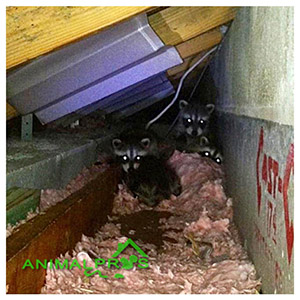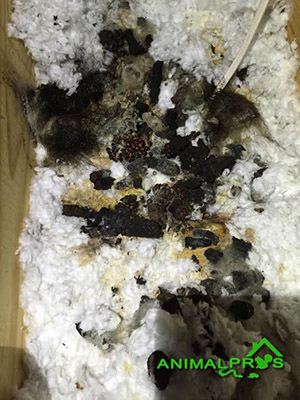Raccoons In The Attic Louisville
 Raccoons can cause extreme amounts of damage in a attic area, in a quick amount of time. Signs of raccoons in the attic can be determined from staining on drywall from the interior, damage on the outside of home, and from the sounds of someone or something walking across your roof. Raccoons are common inhabitants of most residential neighborhoods. They are nocturnal, and sleep during the day, which makes observing activity of raccoon damage difficult to a homeowner. Raccoons will be attracted in or around your home by food, water, and shelter. Raccoons are incredibly strong, and use their hands like we do. It is not hard for a raccoon to open areas to gain access into a attic. Here are some of the areas to keep a eye on.
Raccoons can cause extreme amounts of damage in a attic area, in a quick amount of time. Signs of raccoons in the attic can be determined from staining on drywall from the interior, damage on the outside of home, and from the sounds of someone or something walking across your roof. Raccoons are common inhabitants of most residential neighborhoods. They are nocturnal, and sleep during the day, which makes observing activity of raccoon damage difficult to a homeowner. Raccoons will be attracted in or around your home by food, water, and shelter. Raccoons are incredibly strong, and use their hands like we do. It is not hard for a raccoon to open areas to gain access into a attic. Here are some of the areas to keep a eye on.
- Raccoons going in through gable vent.
- Raccoons going in window dormer or eve gap.
- Raccoons pulled down siding.
- Raccoons chewed a hole in soffit.
- Raccoons ripped a hole in the roofline.
- Raccoons tore off a attic vent.
- Raccoons tore a hole in my roof.
As you can see, there are several places to check for raccoon activity and damage can become very severe. Proper professional help is suggested in dealing with raccoons in the attic.
Louisville Raccoon Damage In a Attic
If you suspect raccoons have been in your attic, chances are you will have some degree of damage. Damage can be done in many cases to insulation, duct work, wiring, and even drywall.
Raccoons damage can quickly become worse in a attic if a female raccoon gives birth to young. Raccoons have a average of 3-5 young, so damage can be increased with the presence of multiple raccoons.
Raccoon Damage To Duct Lines
Raccoons once in a attic, will often associate the cool touch of the duct lines, to water. Using their hands just like we do, they can easily rip and tear duct lines wide open creating big problems. If the raccoon start using the duct line as shelter, or if there is any feces or urine in the line, that leads to contamination and can result in needing to replace the entire duct system. EPA regulations suggest if any animal has entered soft insulated duct work, that there is no amount of duct cleaning that can work. The only thing that will be effective is removing and replacing the duct line. Contaminates from feces and urine do not break down in a hvac line. Disturbance of the droppings from the animal can spread air borne particulates throughout the entire duct system, resulting in major damage. Quick action should be taken if you suspect raccoons are in your duct lines. Call our Animal Pros specialists today.
Raccoon Damage To Insulation
 One of the most common problems with raccoons in the attic is damage to the insulation. Raccoons are very heavy animals often weighing up to 40 lbs, and will damage insulation in several ways. Flattening of the insulation from a heavy raccoon is expected as they move from one end of the attic to the other. Raccoon Latrines or areas that they utilize for their bathroom can quickly damage insulation. Dropping accumulate daily, and there is only so much urine and feces insulation can absorb. Contaminated insulation will need to be properly removed completely. Call our Animal Pros restoration team to help with all your insulation needs.
One of the most common problems with raccoons in the attic is damage to the insulation. Raccoons are very heavy animals often weighing up to 40 lbs, and will damage insulation in several ways. Flattening of the insulation from a heavy raccoon is expected as they move from one end of the attic to the other. Raccoon Latrines or areas that they utilize for their bathroom can quickly damage insulation. Dropping accumulate daily, and there is only so much urine and feces insulation can absorb. Contaminated insulation will need to be properly removed completely. Call our Animal Pros restoration team to help with all your insulation needs.
Raccoon Damage To Electrical Wires
Electrical Wire damage caused by raccoons will usually occur when electric wires are in close proximity to where raccoons are located in your attic. As raccoons move in tight places along the soffit areas in a attic, electrical wires can often get chewed, pulled, or shredded from a raccoon. The most obvious sign if you have raccoons of electric wire damage, is if you have lights, fixtures, plugs, or appliances, that have stopped working. Prompt action is required if you feel raccoons have damaged your electric lines.
Raccoon Damage To Drywall
When raccoon problems have occurred for several days or longer, it is possible to have drywall damage. Damage to drywall or even drop tiles can be from the weight of the raccoon breaking through either. Damage can also occur from the insulation being so penetrated from feces and urine, that now the drywall is absorbing the excess. Spots on your drywall may be dismissed initially as water spots, and have a appearance of dark staining, and in some cases, heavy accumulated areas can contain so much weight it causes drywall to fall through. Call our restoration experts at Animal Pros for immediate drywall problems caused by raccoons.
Louisville Raccoon Feces In Attic
Raccoon feces in a attic can create a serious health hazard. As the animal continually moves over droppings, airborne particulates can be circulated. If there is duct damage, and feces present, this could be a disaster. Proper precautions should be taken for remediating raccoon feces in a attic. Raccoon Latrines should be avoided. Areas in your attic with heavy fecal accumulations need to be kept undisturbed and professional help should be contacted. Fecal accumulations in attic areas can often harbor pathogens, parasites, and bacteria. Droppings do not organically break down as they might naturally outside exposed to the elements. In a attic area with limited ventilation, bacteria and zoonotic disease can be present in raccoon feces. Exposure from disturbance of particulates of contaminated material in your attic can occur, and you should contact Animal Pros specialists for immediate help.
